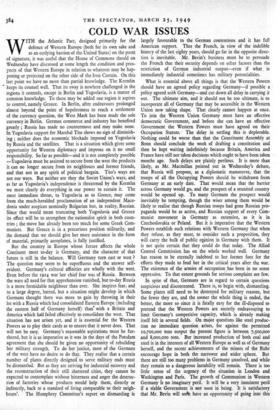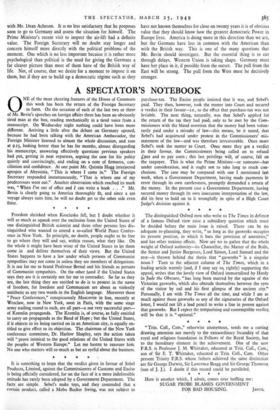COLD WAR ISSUES
WITH the Atlantic Pact, designed primarily for the defence of Western Europe (both for its own sake and as an outlying bastion of the United States) on the point of signature, it was useful that the House of Commons should on Wednesday have discussed at some length the condition and pros- pects of that Western Europe in relation to whatever may be hap- pening or projected on the other side of the Iron Curtain. On this last point we have no more than partial knowledge. The Kremlin keeps its counsel well. That its sway is nowhere challenged in the regions it controls, except in Berlin and Yugoslavia, is a matter of common knowledge. To these may be added one region it aspires to control, namely Greece. In Berlin, after endeavours prolonged almost beyond the point of hopelessness to reach a settlement of the currency question, the West Mark has been made the sole currency in Berlin. German commerce and industry has benefited greatly ; Russia has made no countermove and may make none. In Yugoslavia support for Marshal Tito shows no sign of diminish- ing ; neither does the economic blockade imposed on Yugoslavia by Russia and the satellites. That is a situation which gives some opportunity for Western diplomacy and imposes on it no small responsibility. So far as possible—and it is not completely possible —Yugoslavia must be assisted to secure from the west the products it can no longer secure from its neighbours and former friends, and that not in any spirit of political bargain. Tito's ways are not our ways. But neither are they the Soviet Union's ways, and as far as Yugoslavia's independence is threatened by the Kremlin we must clearly do everything in our power to sustain it. The most immediate threat, to Yugoslavia as to Greece, may come from the much-heralded proclamation of an independent Mace- donia under auspices nominally Bulgarian but, in reality, Russian. Since that would mean truncating both Yugoslavia and Greece its effect will be to strengthen the nationalist spirit in both coun- tries ; the move has already been too much for some Greek Com- munists. But Greece is in a precarious position militarily, and the demand that we should give her more assistance in the form of material, primarily aeroplanes, is fully justified.
But the country in Europe whose future affects the whole Continent most to-day is Germany, and the character of that future is still in the balance. Will Germany turn east or west ? The question may seem to be superfluous and the answer self- evident. Germany's cultural affinities are wholly with the west. Even before the 1914 war her chief fear was of Russia. Between the wars all need for that apprehension vanished, but to-day Russia is a more formidable neighbour than ever. She inspires fear, and to a large degree, hatred, but a situation might develop in which Germans thought there was more to gain by throwing in their lot with a Russia which had consolidated Eastern Europe (including the eastern half of Germany herself) than with a Britain and America which hail failed effectively to consolidate the west. That situation has not arisen yet, and it is essential for the Western Powers so to play their cards as to ensure that it never does. That will not be easy. Germany's reasonable aspirations must be fur- thered, but it is as imperative as it was in the days of the Potsdam agreement that she should be given no opportunity of rebuilding her military strength. To do her justice, most of the Germans of the west have no desire to do that. They realise that a certain number of plants directly designed to serve military ends must be dismantled. But as they are striving for industrial recovery and the reconstruction of their still shattered cities, they cannot be expected to contemplate without bitterness and anger the destruc- tion of factories whose products would help them, directly or indirectly, back to a standard of living comparable to their neigh- bours'. The Humphrey Committee's report on dismantling is largely favourable to the German contentions and it has full American support. That the French, in view of the indelible history of the last eighty years, should go far in the opposite direc- tion is inevitable. Mr. Bevin's business must be to persuade the French that their security depends on other factors than the restriction of German industrial output—even if what, is immediately industrial sometimes has military potentialities.
What is essential above all things is that the Western Powers should have an agreed policy regarding Germany—if possible a policy agreed with Germany—and cut down all delay in carrying it out. The ultimate aim, and it should not be too ultimate, is to incorporate all of Germany that may be accessible in the Western Union now taking shape. That clearly cannot happen at once. To join the Western Union Germany must have an effective democratic Government, and before she can have an effective Government the Western Powers must have agreed on their Occupation Statute. The delay in settling this is deplorable. Nothing could be worse than that the Constituent Assembly at Bonn should conclude the work of drafting a constitution and then be kept waiting indefinitely because Britain, America and France have still not taken decisions which ought to have been taken months ago. Such delays are plainly perilous. It is more than likely, as Mr. Macmillan pointed out in Wednesday's debate, that Russia will propose, as a diplomatic manoeuvre, that the troops of all the Occupying Powers should be withdrawn from Germany at an early date. That would mean that the barrier across Germany would go, and the prospect of a reunited country would be opened up. To many Germans the prospect would inevitably be tempting, though the wiser among them would be likely to realise that though Russian troops had gone Russian pro- paganda would be as active, and Russian support of every Com- munist movement in Germany as extensive, as it is in Czechoslovakia or Poland. But it is imperative that the Western Powers establish such relations with Western Germany that when they refuse, as they must, to consider such a proposition, they will carry the bulk of public opinion in Germany with them. It is not quite certain that they could do that today. The Allied Control Commission has on the whole worked well. Germany has reason to be eternally indebted to her former foes for the efforts they made to feed her in the critical years after the war. The existence of the armies of occupation has been in no sense oppressive. To that extent grounds for serious complaint are few.
In spite of that, Germans are in regard to certain questions suspicious and discontented. There is, to begin with, dismantling. Some plants still need to be destroyed for military reasons, but the fewer they are, and the sooner the whole thing is ended, the better, the more so since it is fatally easy for the ill-disposed to pretend that the Western Powers are secretly endeavouring to limit Germany's competitive capacity, which is already making itself felt in several fields. On major questions like steel produc- tion no immediate question arises, for against the permitted 10,700,000 tons output the present figure is between 7,500,000 and 8,000,000 tons. But increased production of both coal and steel is in the interests of all Western Europe as well as of Germany herself, and the recent achievements of the miners of the Ruhr encourage hope in both the narrower and wider sphere. But there are still too many problems in Germany unsolved, and while they remain so a dangerous instability will remain. There is too little sense of the urgency of the situation in London and Washington and Paris. The growth of Communism in Western Germany is no imaginary peril. It will be a very imminent peril if a stable Government is not soon in being. It is satisfactory that Mr. Bevin will soda have an opportunity of going into this with Mr. Dean Acheson. It is no less satisfactory that he proposes soon to go to Germany and assess the situation for himself. The Prime Minister's recent visit to inspect the air-lift had a definite value. The Foreign Secretary will no doubt stay longer and concern himself more directly with the political problems of the moment. One which is no less important because it is rather more psychological than political is the need for giving the Germans a far clearer picture than most of them have of the British way of life. Not, of course, that we desire for a moment to impose it on them, but if they are to build up a democratic regime such as they have not known themselves for close on twenty years it is of obvious value that they should know how the greatest democratic Power in Europe lives. America is doing more in this direction than we are, but the Germans have less in common with the American than with the British way. This is one of the many questions that Mr. Bevin should investigate. But the essential thing is to cut through delays. Western Union is taking shape. Germany must have her place in it, if possible from the outset. The pull from the East will be strong. The pull from the West must be decisively stronger.















































 Previous page
Previous page